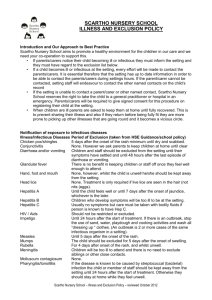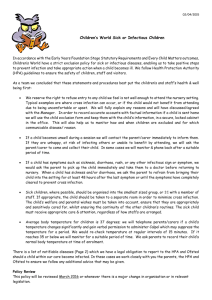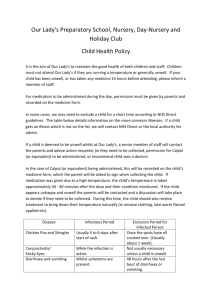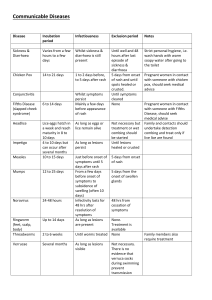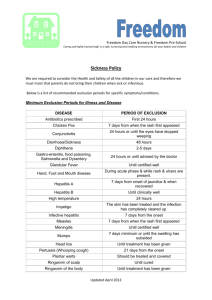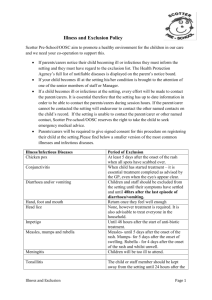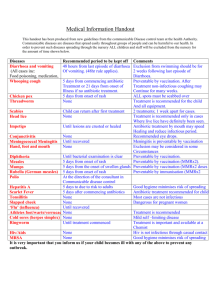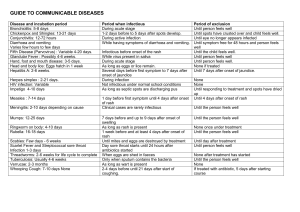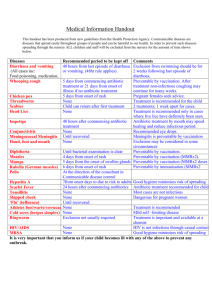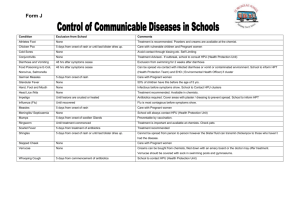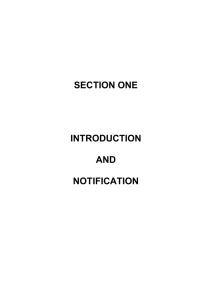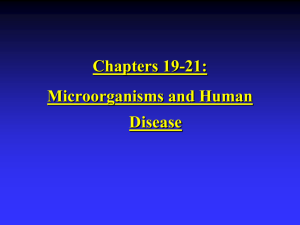Illness and Exclusion Policy - Bracebridge Heath Pre
advertisement
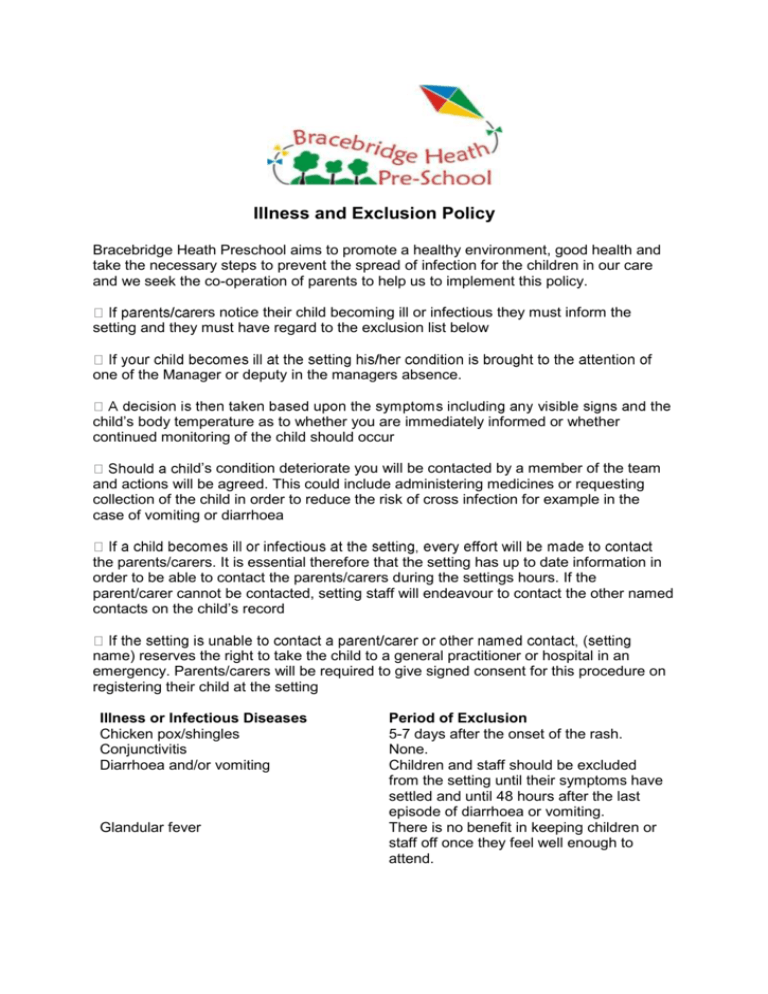
Illness and Exclusion Policy Bracebridge Heath Preschool aims to promote a healthy environment, good health and take the necessary steps to prevent the spread of infection for the children in our care and we seek the co-operation of parents to help us to implement this policy. ers notice their child becoming ill or infectious they must inform the setting and they must have regard to the exclusion list below one of the Manager or deputy in the managers absence. child’s body temperature as to whether you are immediately informed or whether continued monitoring of the child should occur d’s condition deteriorate you will be contacted by a member of the team and actions will be agreed. This could include administering medicines or requesting collection of the child in order to reduce the risk of cross infection for example in the case of vomiting or diarrhoea the parents/carers. It is essential therefore that the setting has up to date information in order to be able to contact the parents/carers during the settings hours. If the parent/carer cannot be contacted, setting staff will endeavour to contact the other named contacts on the child’s record name) reserves the right to take the child to a general practitioner or hospital in an emergency. Parents/carers will be required to give signed consent for this procedure on registering their child at the setting Illness or Infectious Diseases Chicken pox/shingles Conjunctivitis Diarrhoea and/or vomiting Glandular fever Period of Exclusion 5-7 days after the onset of the rash. None. Children and staff should be excluded from the setting until their symptoms have settled and until 48 hours after the last episode of diarrhoea or vomiting. There is no benefit in keeping children or staff off once they feel well enough to attend. Hand, foot and mouth None, however, whilst the child is unwell he/she should be kept away from the setting. Head lice None. Treatment is only required if live lice are seen in the hair (not nits (eggs)). Hepatitis Hep A- Until the child feels well or until 7 days after the onset of jaundice, whichever is the later. Hep B-Children who develop symptoms will be too ill to be at the setting. Hep C-Usually no symptoms but care must be taken with bodily fluids if person is known to have Hep C. HIV / Aids Impetigo Should not be restricted or excluded. Until 24 hours after the start of treatment. If there is an outbreak, stop the use of sand, water, playdough and cooking activities and wash all “dressing up “ clothes. (An outbreak is 2 or more cases of the same infectious organism in a setting). Measles, mumps and rubella Measles- yes, until 5 days after the onset of the rash. Mumps-the child should be excluded for 5 days after the onset of swelling. Rubella- for 4 days after onset of the rash, and whilst unwell. Meningitis Molluscum contagiosum Pharyngitis/tonsillitis Rashes Ringworm (Tinea) Scarlet fever / Scarletina Children will be too ill to attend and there is no need to exclude siblings or other close contacts. None. If the disease is known to be caused by streptococcal (bacterial) infection the child or member of staff should be kept away from the setting until 24 hours after the start of treatment. Otherwise they should stay at home while they feel unwell. A child who is unwell and has a rash should visit their GP to establish the reason for it. Children need not be excluded but spread can be prevented by good personal hygiene, regular hand washing and use of separate towels and toilet articles. Parents should be encouraged to seek treatment. Once a patient has been on antibiotic treatment for 24 hours they can return, provided they feel well enough. Slapped cheek syndrome (Erythema Infectiosum/fifth disease) Scabies Typhoid, paratyphoid (enteric fever) Tuberculosis (TB) Verrucae Whooping cough (Pertussis) Worms An affected child need not be excluded because they are no longer infectious by the time the rash occurs. Not necessary, but treatment should be commenced. Yes, an infected child is likely to be very ill and whilst infectious unable to attend the setting. “Open” cases- until 2 weeks after treatment started. “Open” cases of drug resistant TB when the hospital physician advises. (“open” is determined by sputum samples). Not necessary. An affected child and unvaccinated contacts under 7 years should be excluded until they have had 5 days of antibiotics. Not necessary. We will actively promote the use of the ‘Catch it, Bin it, and Kill it’ initiative to teach children about good hygiene practices by promoting: arm soapy water as soon as possible, before eating, preparing food and after toileting. Notification of exposure to infectious diseases If a child contracts any of the above infectious diseases, other parents will be informed by an emergency newsletter and information on the notice board. If we have reason to believe that any child is suffering from a notifiable disease identified as such in the Public Health (Infection Diseases) Regulations 2010, we will inform the East Midlands North Health Protection Team and Ofsted (EYFS requirement 3.49). We will act on any advice given by them and inform Ofsted of any action taken. A list of notifiable diseases can be found at www.hpa.org.uk and is displayed on our parent’s notice board alongside the HPA poster ‘Guidance on Infection Control in Schools and other Child Care Settings’. The East Midlands North Health Protection Team can be contacted at: Institute of Population Health City Hospital Hucknall Road Nottingham NG5 1PB Telephone number: 0844 225 4524 Fax: 01159 693523 Providers should note that from 1st April 2013 the Health Protection Agency (HPA) became part of Public Health England their website is still evolving but further guidance on infection control in schools and childcare settings can still be currently found at www.hpa.org.uk. This policy has been adopted by the committee of Bracebridge Heath Preschool Signed on behalf of the setting by: …………………………………………………… Chairperson/ other on their behalf ………………………………………………….. Manager Date: Review Date (BFS/Safeguarding&WelfareRequirements/Health/Illness&ExclusionPolicy/May2013)
